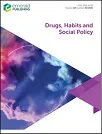| Titre : | Challenges, policy and politics in drug checking: reflections of the TEDItorial team (2022) |
| Auteurs : | N. VAN DER LINDEN ; R. P. J. KONING ; D. VAN DER GOUWE ; M. VENTURA ; F. MEASHAM |
| Type de document : | Article : Périodique |
| Dans : | Drugs, Habits and Social Policy (Vol.23, n°3, 2022) |
| Article en page(s) : | 289-302 |
| Langues: | Anglais |
| Discipline : | PRE (Prévention - RdRD / Prevention - Harm reduction) |
| Mots-clés : |
Thésaurus mots-clés REDUCTION DES RISQUES ET DES DOMMAGES ; POLITIQUE ; DROGUES DE SYNTHESE ; PRODUIT ILLICITE ; TEST ; ANALYSE CHIMIQUE ; RECOMMANDATION |
| Résumé : |
Purpose: The purpose of this paper is to present some of the continued resistance and challenges faced by drug checking services (DCS) and review how the existing literature and the contributions to the special issue address them, with a view to making recommendations.
Design/methodology/approach: The existing literature and the contributions to the special issue are reviewed. Findings: Drug checking cannot be equated with quality control. With the appropriate equipment and chemistry staff, DCS can provide quantitative analysis and reliable results. When the product does not match expectations, service users discard the tested substance of concern. To more easily compare the results of different studies and better evaluate drug checking, standardisation of measures is desirable. Uptake of drug checking, notably in festivals, is low and depends in part on the capacity of DCS. Drug checking has added value in monitoring drug markets and is complementary with chemical (forensic) analysis. Originality/value: This paper interrogates in a relatively comprehensive way the continued resistance to drug checking in light of theoretical and empirical research to derive recommendations that are specific to drug checking and that are addressed to health professionals, researchers and also to policymakers. |
| Domaine : | Drogues illicites / Illicit drugs |
| Sous-type de document : | Revue de la littérature / Literature review |
| Affiliation : | Modus Vivendi asbl, Brussels, Belgium; Center for Social and Cultural Psychology, Université Libre de Bruxelles, Brussels, Belgium and Trans European Drug Information (TEDI), NEWNet, Paris, France |
| Lien : | https://doi.org/10.1108/DHS-10-2022-0037 |
 Accueil
Accueil



